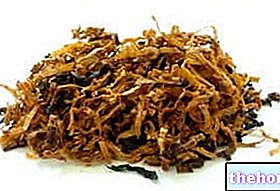Nicotine is an alkaloid of plant origin, particularly concentrated in the leaves of tobacco (Nicotiana tabacum). Its name derives from that of the French ambassador Jean Nicot, who in 1550 introduced the seeds of the plant to Europe, while the term tabacum refers to the pipe used by the North American Indians to smoke the leaves.

The effects of nicotine are however complex, linked to the dosage of intake and extended to different organs and systems. In high doses it is a powerful poison, so much so that 60 mg injected into a vein is generally sufficient to pass to a better life; in the past it has been used as an excellent pesticide.
The nicotine consumed through cigarette smoke is metabolized with a certain rapidity, which is greater in the habitual smoker than in the novice.
The risk of overdose is low, as the user unconsciously tends to adjust the consumption of cigarettes to their plasma nicotine levels. Some additional problems may exist for patients treated with replacement therapy based on transdermal patches, especially when they are not used according to the instructions of your doctor or pharmacist.
Effects of nicotine
At low doses, nicotine has a stimulating effect: it slightly increases heart rate and blood pressure, causes light sweating, improves concentration, increases metabolism, suppresses hunger and reduces stress. In short, all is well, if it were not for a small detail: repeated doses of nicotine increase the concentration of its receptors in the brain, generating addiction. It is precisely the interaction with the nicotinic receptors of acetylcholine that increases the release of adrenaline, the hormone responsible for the stimulating properties just described.
At high dosages, however, nicotine blocks these receptors, with opposite effects to those listed (hypotension, vasodilation, diarrhea, arrhythmias, drowsiness, headache), leading to complete paralysis of the respiratory muscles.
Heavy smokers experience unpleasant sensations when they go into withdrawal. In these cases, symptoms such as depression, constipation, anxiety, nervousness, bulimia crisis, reduced heart rate and blood pressure, are promptly corrected by taking the substance.
Beyond the nicotine concentration, which in itself is toxic but not carcinogenic, the harmful effects related to the smoking habit are mainly due to the substances that develop during the combustion of the cigarette; among the 4000 found in tobacco smoke there are they are at least sixty carcinogens (remember nitrosamines, benzopyrene and various aromatic compounds), and other poisonous ones, such as arsenic and cyanide, or irritants, see ammonia and formaldehyde. What are the repercussions on health? To say this, just remember that, on average, a smoker has a life expectancy of 8 years lower than that of a non-smoker.
Smoking during pregnancy can cause a delay in the baby's growth, mental and lung development.
Nicotine is excreted in breast milk in quantities directly proportional to the tobacco smoked, so much so that the excessive consumption of cigarettes by the nurse can cause a whole series of ailments to the newborn, such as restlessness, loss of appetite, tachycardia, vomiting and diarrhea.
it increases gastric acidity and inhibits the secretion of pancreatic bicarbonates: this is a dangerous effect especially for those suffering from gastritis, gastroesophageal reflux and gastric or duodenal ulcers.
Slightly increases blood pressure - this is the reason hypertensive and heart patients should not smoke.
It determines peripheral vasoconstriction: rather dangerous effects for those suffering from peripheral vasculopathies.
However, as mentioned, the toxicity of nicotine at the usual doses is all in all modest; far more serious are the side effects attributable to the thousands of toxic and carcinogenic substances present in tobacco smoke (see: damage from smoking).



.jpg)
























